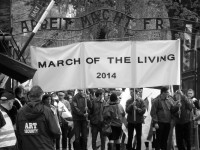Having discussed the importance of fair dealing for creators in yesterday’s post, today’s case looks at the link between freedom of expression and fair dealing. A recent case involving the Vancouver Aquarium placed the spotlight on how fair dealing can be used to safeguard freedom of expression, even when (indeed particularly when) a rights holder may prefer to use copyright to block the expression. In 2015, two film makers created a documentary on the Vancouver Aquarium called “Vancouver Aquarium Uncovered.” The film, which can now be viewed online, focuses on whales and dolphins in captivity. The Vancouver Aquarium filed a copyright infringement action, seeking to have the documentary removed from all public viewings and the deletion of photos and video clips shot at the aquarium.
Search Results for "29.21" : 12
Canada’s Non-Commercial Copyright Fail: Why Did YouTube Mute a Holocaust Memorial Video?
Holocaust Remembrance Day (Yom HaShoah) starts tonight with events planned around the world. Last year, my daughter Jordan participated in the March of the Living, an annual event that brings thousands of people from around the world to the concentration camps in Poland. The experience had a profound effect and since her return she has become increasingly active within the March of the Living organization including joining the Ottawa board of directors. As part of tonight’s Holocaust remembrance event in Ottawa, she was asked to create a video to commemorate last year’s trip including interviews with participants, pictures, and video. She spent hours interviewing 18 participants on their experience and worked through hundreds of photos and hours of video to create a five-minute snapshot.
Last week, she posted the video to YouTube in anticipation of tonight’s event. Within hours, she received a message from the event organizer’s wondering why so few interviews appeared on the video. When she looked into the issue, she found that YouTube had muted the audio track with interviews after a couple of minutes (at 2:14 to be precise). The reason? The video includes some copyrighted background music. YouTube’s approach when it matches audio to a copyrighted work is to mute the non-music track, though it provides an option to fill out a fair dealing/fair use claim. Jordan did that, pointing out that Section 29.21 of the Canadian Copyright Act provides specific protection for non-commercial user generated content. The provision states:
Why Universities Should Not Sign the Access Copyright – AUCC Model Licence
Last week, I was asked by the Association of Professors Ottawa, the University of Ottawa faculty union, for my views. I opened my remarks by emphasizing a key misconception often fueled by Access Copyright and its supporters. The question being faced by the universities is not whether to pay for copyright works. Universities, faculty and students currently spend millions of dollars every year on copyright materials and will continue to do so. The only question is whether – in addition to existing expenditures on books, licences, and in support of open access – they should also pay the $26 per student fee to Access Copyright.
I believe the answer is no for the following six key reasons:
Something for Nothing: The Non-Existent Benefit of Linking in the Access Copyright Deal
any reproduction, in any material form whatever, including a Digital Copy, that is made by or as a consequence of any of the following activities
(k) posting a link or hyperlink to a Digital Copy.
Critics argue that this provision gives the AUCC no value as there is simply no need to license such activities. The inclusion of the provision means students will be paying something – there must some notional part of the $26 annual fee that covers this section – for nothing. Supporters of the deal, including AUCC, claim otherwise. Indeed, the AUCC FAQ has two questions and answers on point:
61 Reforms to C-61, Day 3: Format Shifting Subject to Digital Lock Provision
Yesterday's reform focused on one key limitation in the format shifting provision, namely the odd limitation of the format shifting provision to videocassettess. Today's reform picks up on what will be a consistent theme throughout this series – the subordination of any consumer rights to the digital lock. Indeed, virtually […]








